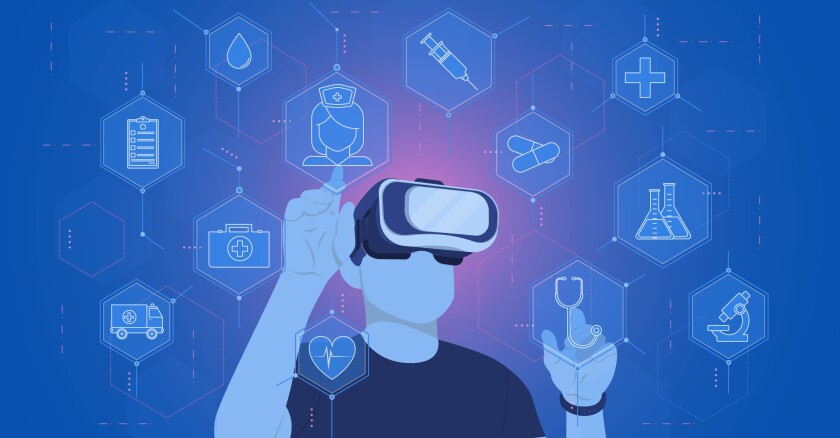Science
Ohio Universities Embrace AI and VR to Transform Healthcare Education

Ohio universities are incorporating advanced technologies like artificial intelligence (AI) and virtual reality (VR) into their healthcare education programs. This shift aims to enhance students’ readiness for real-world medical scenarios before they engage with actual patients. With the rapid evolution of AI technology in healthcare, institutions are adapting curricula to equip future healthcare workers with essential skills.
Innovative Learning Experiences at Cedarville University
Cedarville University’s nursing program has taken a significant step by integrating VR headsets and training platforms, thanks to a grant from Bodyswaps, a London-based software company. Associate Professor of Nursing Nate Kincaid emphasizes the importance of teaching students to use these technologies responsibly. “They’re going to be using it more and more,” Kincaid remarked. “Let’s teach them to use it responsibly.”
The VR program allows students to interact with computer-generated patients in realistic scenarios, ranging from initial medical visits to delivering difficult news. The system assesses students on various aspects, including eye contact, communication, and empathy. By altering scenario parameters, the program exposes students to diverse geographic, socio-economic, and cultural backgrounds.
Personalized Learning Through AI at Wright State University
At Wright State University, Faculty Professor Dr. Yi-Hui Lee is actively exploring how AI can revolutionize education and the healthcare workforce. She attended multiple conferences over the summer focused on AI’s potential to create individualized learning experiences. “In the future, with AI’s help, we can have more personalized learning and personalized diagnoses,” Lee stated.
AI tools are being utilized to tailor learning plans based on individual student progress, identifying weaknesses, and providing targeted training. This technology also enhances efficiency in healthcare settings, allowing providers to focus more on patient interactions rather than administrative tasks. “Healthcare providers can intercede earlier, making healthcare predictive instead of reactive,” Lee explained.
As the nursing workforce faces a national shortage, AI can help alleviate some of the burdens on healthcare managers by optimizing scheduling and addressing issues like nurse burnout.
Expanding AI Education Initiatives
Sinclair Community College has launched a comprehensive $5 million initiative called the AI Excellence Institute, aimed at integrating AI training across all disciplines. Dean of eLearning Christi Amato compares this integration to the advent of the internet in the early 1990s, emphasizing the need for students to critically evaluate information sources. “You have the obligation as a critical thinker to ask where did that information come from,” Amato noted.
Sinclair’s health sciences program leverages AI to create risk-free real-world simulations, allowing students to practice essential skills, such as monitoring childbirth and performing IV insertions in simulated emergency settings. Program Director Wendy Moore highlights the value of hands-on experience, stating, “You can read a book all day, but it doesn’t give that real-life experience.”
Further innovative projects are underway at Miami University, where a $1.5 million grant from the Ohio Bureau of Workers’ Compensation is funding the development of the Safety Immersion and Gamified Hazard Training (SIGHT) program. This initiative combines AI and VR to enhance safety training in manufacturing, aiming to reduce workplace injuries.
Chair and Professor of Engineering Technology Mohammed Mayyas explained the AM Hub’s role in advancing the SIGHT initiative, describing it as a hands-on, interdisciplinary ecosystem that fosters collaboration among students, faculty, and industry partners. “It bridges education, innovation, and workforce development,” Mayyas added.
The SIGHT program promises to deliver safety training through custom VR simulations tailored to specific work environments, complemented by augmented reality coaching that provides real-time feedback. The university anticipates expanding this program beyond Ohio by 2028.
As Ohio universities integrate AI and VR technologies, they not only prepare students for the demands of modern healthcare but also aim to enhance patient care and safety across various sectors. While the potential benefits are significant, experts caution that these technologies should complement, not replace, the human element in healthcare.
-

 World2 days ago
World2 days agoCoronation Street’s Shocking Murder Twist Reveals Family Secrets
-

 Entertainment4 months ago
Entertainment4 months agoKate Garraway Sells £2 Million Home Amid Financial Struggles
-

 Entertainment3 months ago
Entertainment3 months agoAnn Ming Reflects on ITV’s ‘I Fought the Law’ Drama
-

 Health3 months ago
Health3 months agoKatie Price Faces New Health Concerns After Cancer Symptoms Resurface
-

 Entertainment3 weeks ago
Entertainment3 weeks agoCoronation Street Fans React as Todd Faces Heartbreaking Choice
-

 World3 weeks ago
World3 weeks agoBailey Announces Heartbreaking Split from Rebecca After Reunion
-

 World5 days ago
World5 days agoKevin Sinfield Exceeds Fundraising Goal Ahead of Final Marathons
-

 Entertainment3 months ago
Entertainment3 months agoCoronation Street’s Carl Webster Faces Trouble with New Affairs
-

 Entertainment4 days ago
Entertainment4 days agoTwo Stars Evicted from I’m A Celebrity Just Days Before Finale
-

 Entertainment3 months ago
Entertainment3 months agoWhere is Tinder Swindler Simon Leviev? Latest Updates Revealed
-

 Entertainment4 months ago
Entertainment4 months agoMarkiplier Addresses AI Controversy During Livestream Response
-

 Science2 months ago
Science2 months agoBrian Cox Addresses Claims of Alien Probe in 3I/ATLAS Discovery




















